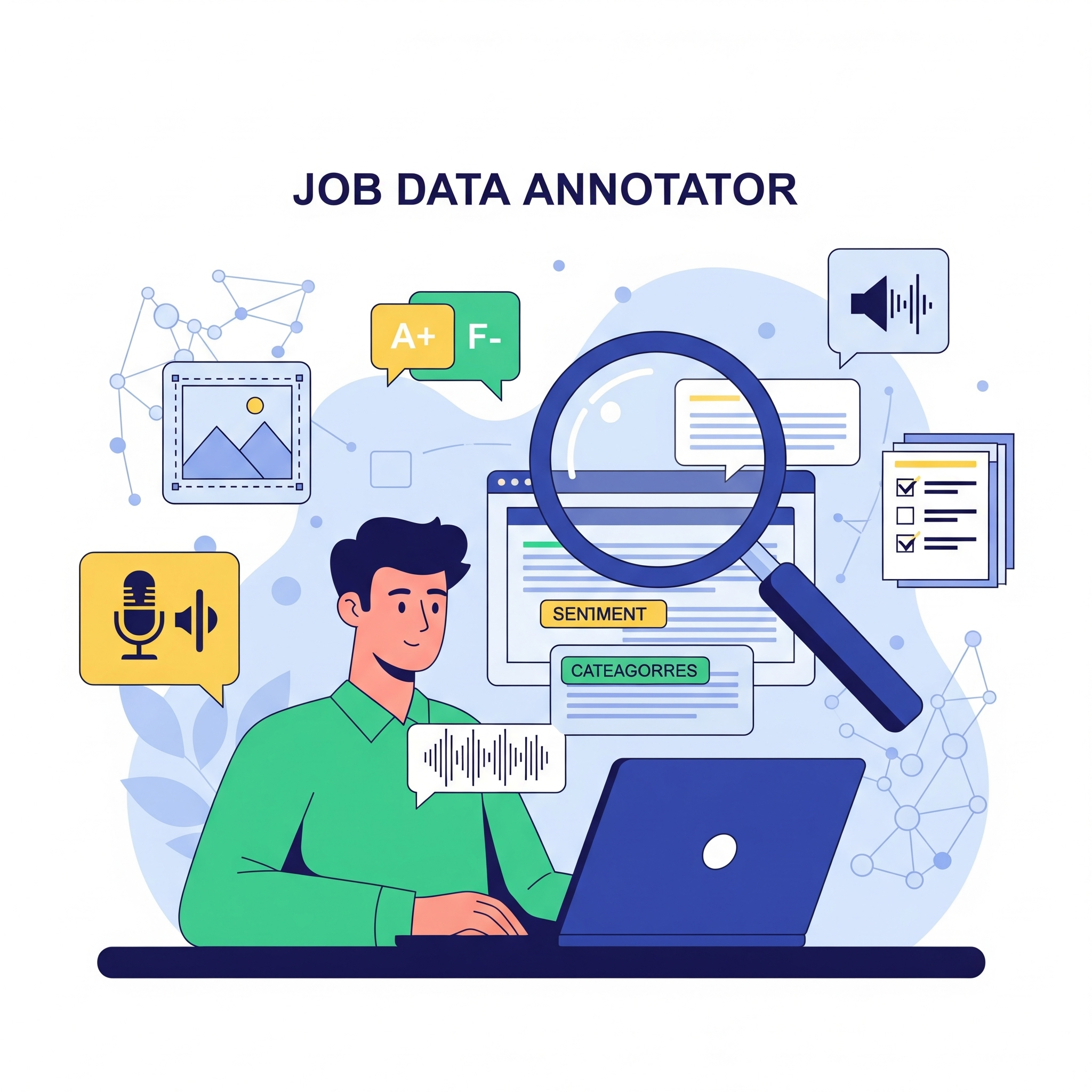What is a Data Annotation Specialist?
A Data Annotation Specialist is a professional responsible for labeling, tagging, and categorizing raw data to make it understandable and usable for machine learning (ML) models. In the world of Artificial Intelligence (AI), data is the fuel that powers algorithms. However, for a computer to learn, it needs structured, labeled data. This is where the data annotator comes in. They meticulously add metadata to various types of data—text, images, video, audio, and more—so that AI models can be trained to recognize patterns and make accurate predictions.
Key Responsibilities
The daily tasks of a Data Annotation Specialist can vary widely depending on the type of project, but common responsibilities include:
- Image Annotation: Drawing bounding boxes, polygons, or key points around objects in images to help computer vision models identify them. For example, labeling cars, pedestrians, and traffic signs in images for a self-driving car company.
- Video Annotation: Performing similar tasks to image annotation but across a sequence of video frames to track objects' movements over time.
- Text Annotation: Assigning sentiment labels (e.g., positive, negative, neutral) to customer reviews, identifying entities like names and locations (Named Entity Recognition), or categorizing text based on its topic.
- Audio Annotation: Transcribing spoken words or identifying specific sounds (like a doorbell or a dog barking) within audio clips.
- Data Quality Assurance: Reviewing the work of other annotators to ensure accuracy and consistency, providing feedback to maintain high data quality standards.
- Following Annotation Guidelines: Adhering strictly to project-specific rules and guidelines to ensure consistency and prevent errors.
- Reporting and Communication: Providing feedback on ambiguous data or challenging annotation tasks to team leads or project managers.
Essential Skills and Qualifications
A successful Data Annotation Specialist requires a blend of attention to detail and a keen understanding of the data's context.
Hard Skills
- Computer Literacy: Proficiency with standard computer software and the ability to quickly learn new annotation tools and platforms.
- Typing Skills: Fast and accurate typing is crucial for text and audio transcription projects.
- Familiarity with Data Types: A basic understanding of different data formats (e.g., .jpg, .png, .mp3, .csv).
- Knowledge of AI/ML (beneficial): While not always required, a foundational understanding of how AI models are trained can help in making more informed annotation decisions.
Soft Skills
- Exceptional Attention to Detail: This is the most critical skill. Mistakes in labeling can lead to inaccurate models, so precision is paramount.
- Patience and Focus: Annotation tasks can be repetitive and require long periods of concentration.
- Strong Communication: The ability to clearly articulate challenges and provide feedback on data quality.
- Critical Thinking: The capacity to interpret complex guidelines and make logical decisions on how to label ambiguous data.
- Adaptability: The ability to quickly pivot between different projects and learn new sets of rules.
The Role's Importance in AI
Without accurately labeled data, most AI and machine learning applications would not be possible. Data annotators are the unseen heroes behind many of the technologies we use daily, including:
- Facial Recognition: Labeling facial features in images.
- Voice Assistants (Siri, Alexa): Transcribing and labeling audio commands.
- Autonomous Vehicles: Annotating road objects for safe navigation.
- Personalized Recommendations: Categorizing user data to improve recommendation algorithms.
- Medical Diagnosis: Labeling medical scans to train AI to detect diseases.
Career Path and Outlook
The role of a Data Annotation Specialist is often an entry-level position in the tech and AI industry. It serves as an excellent starting point for individuals interested in AI, machine learning, and data science. Potential career paths from this role include:
- Data Annotation Lead/Manager: Supervising a team of annotators and managing projects.
- Data Analyst: Analyzing the labeled data to find trends and insights.
- Machine Learning Engineer: With further education and training, transitioning into a role focused on building and deploying ML models.
The demand for skilled data annotators is expected to continue to grow as more industries adopt AI-powered solutions.
Tips for Getting Started
- Build a Portfolio: While not always necessary, creating a small personal project (e.g., using a public dataset) and showcasing your annotation skills can set you apart.
- Online Courses: Take courses on platforms like Coursera, edX, or Udacity that cover data science, machine learning, or computer vision basics.
- Look for Freelance and Remote Opportunities: Many companies and platforms hire remote data annotators on a freelance or contract basis. This is a great way to gain experience.
- Highlight Your Soft Skills: On your resume, emphasize your attention to detail, problem-solving abilities, and work ethic.
Potential Challenges
- Repetitive Tasks: The work can be monotonous, requiring a high degree of focus to prevent burnout.
- Ambiguous Data: Some data can be difficult to categorize, requiring careful interpretation of complex guidelines.
- Project-Based Work: Many roles are contract-based, which can lead to periods of unpredictable work.
Despite these challenges, a career as a Data Annotation Specialist offers a flexible entry point into a booming industry, providing valuable experience and a foundation for future roles in the world of data and AI.
